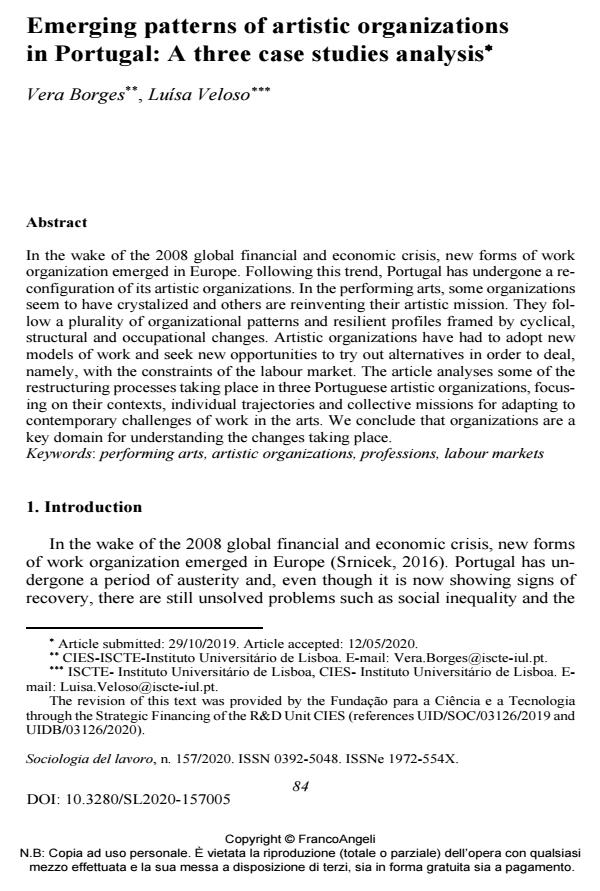Modelli emergenti di organizzazioni artistiche in Portogallo: un’analisi di tre studi di caso
Journal title SOCIOLOGIA DEL LAVORO
Author/s Vera Borges, Luísa Veloso
Publishing Year 2020 Issue 2020/157
Language English Pages 24 P. 84-107 File size 285 KB
DOI 10.3280/SL2020-157005
DOI is like a bar code for intellectual property: to have more infomation
click here
Below, you can see the article first page
If you want to buy this article in PDF format, you can do it, following the instructions to buy download credits

FrancoAngeli is member of Publishers International Linking Association, Inc (PILA), a not-for-profit association which run the CrossRef service enabling links to and from online scholarly content.
In the wake of the 2008 global financial and economic crisis, new forms of work organization emerged in Europe. Following this trend, Portugal has undergone a reconfiguration of its artistic organizations. In the performing arts, some organiza-tions seem to have crystalized and others are reinventing their artistic mission. They follow a plurality of organizational patterns and resilient profiles framed by cyclical, structural and occupational changes. Artistic organizations have had to adopt new models of work and seek new opportunities to try out alternatives in order to deal, namely, with the constraints of the labour market. The article anal-yses some of the restructuring processes taking place in three Portuguese artistic organizations, focusing on their contexts, individual trajectories and collective missions for adapting to contemporary challenges of work in the arts. We conclude that organizations are a key domain for understanding the changes taking place.
Keywords: Performing arts, artistic organizations, professions, labour markets
- The transformative role of Angels’ cultural organisations under austerity Raquel Rego, Vera Borges, in Cultural Trends /2021 pp.156
DOI: 10.1080/09548963.2021.1873702 - Social enterprises in culture and the arts: institutional trajectories of hybridisation in the Portuguese changing cultural mix Sílvia Ferreira, Pedro Fidalgo, Paula Abreu, in International Journal of Cultural Policy /2023 pp.926
DOI: 10.1080/10286632.2022.2144843 - Grant-flipping across Europe: How Portuguese artists navigate precarity to sustain aspirations beyond recognition Vera Borges, in Poetics 102059/2025 pp.102059
DOI: 10.1016/j.poetic.2025.102059
Vera Borges, Luísa Veloso, Emerging patterns of artistic organizations in Portugal: A three case studies analysis in "SOCIOLOGIA DEL LAVORO " 157/2020, pp 84-107, DOI: 10.3280/SL2020-157005